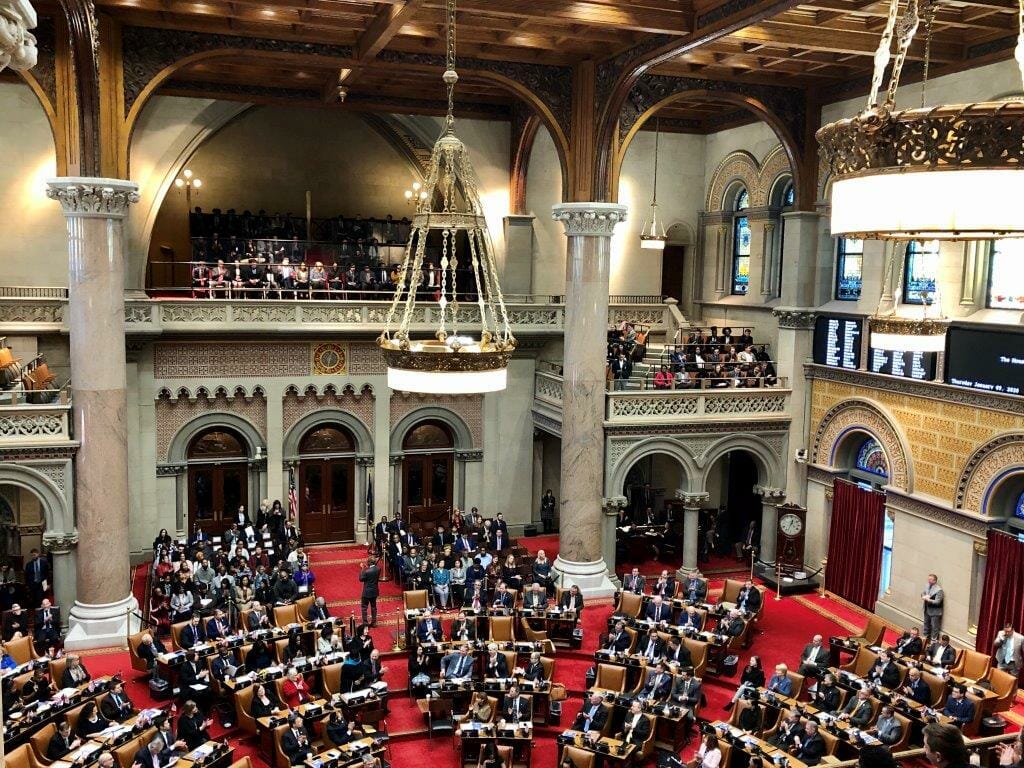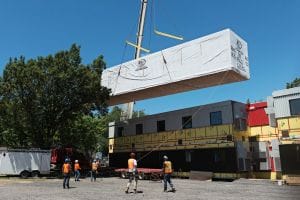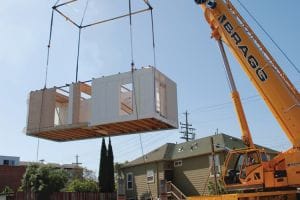Modular Building Institute Protects Members Doing Business in New York
Early during the 2020 New York State Legislature session, two companion bills—S5420 and A2933—were introduced. These bills would require the use of New York City union labor for all buildings built in the city and potentially the state, regardless of where the buildings were built or manufactured.
The Modular Building Institute (MBI) took immediate action as Government Affairs Director Jon Hannah and Executive Director Tom Hardiman began vetting potential lobbying firms to represent the industry in combatting these bills. The Carnelian Group, led by experienced lobbyist Claudia Granados, was retained and began working immediately with the bill sponsors and leadership to educate them on the modular industry and to ask for their assistance to withdraw or defeat these bills.
“In many cases, MBI devotes a lot of time an effort to kill legislation that would be harmful to the commercial modular construction industry”, said Hardiman. “We have to maintain a strong defense of our industry’s interests.”
As the COVID-19 pandemic began to take center stage in March for the legislature, Granados and MBI continued to work behind the scenes with the bill sponsors as well as House and Senate leadership to continue to express our concerns with these bills and the negative impact it would have on our industry and for New York City and the state.
“My approach,” said Granados, “was to focus on the positive impacts provided by the modular construction industry: cost savings, faster completion, environmental friendliness while delivering quality construction. Our goal was to position the MBI model as that of an industry disruptor for the greener and greater social good.”
With the legislative session scheduled to end in June, the legislature decided to return for a Special Session in August to address bills related to COVID19 as well as a cap of 100 additional bills. On August 18, New York City Mayor Bill de Blasio announced he was presenting a bill to the legislature that would force Project Labor Agreements (PLAs) which would require contractors working in the city to hire only certain restricted New York laborers for their work on any structure in the city. These agreements would have even stricter guidelines than the bills already presented.
Early during the 2020 New York State Legislature session, two companion bills—S5420 and A2933—were introduced. These bills would require the use of New York City union labor for all buildings built in the city and potentially the state, regardless of where the buildings were built or manufactured.

“My approach was to focus on the positive impacts provided by the modular construction industry: cost savings, faster completion, environmental friendliness while delivering quality construction. Our goal was to position the MBI model as that of an industry disruptor for the greener and greater social good.”
Claudia Granados, founder and lobbyist, The Carnelian Group
The Modular Building Institute (MBI) took immediate action as Government Affairs Director Jon Hannah and Executive Director Tom Hardiman began vetting potential lobbying firms to represent the industry in combatting these bills. The Carnelian Group, led by experienced lobbyist Claudia Granados, was retained and began working immediately with the bill sponsors and leadership to educate them on the modular industry and to ask for their assistance to withdraw or defeat these bills.
“In many cases, MBI devotes a lot of time an effort to kill legislation that would be harmful to the commercial modular construction industry”, said Hardiman. “We have to maintain a strong defense of our industry’s interests.”
As the COVID-19 pandemic began to take center stage in March for the legislature, Granados and MBI continued to work behind the scenes with the bill sponsors as well as House and Senate leadership to continue to express our concerns with these bills and the negative impact it would have on our industry and for New York City and the state.
“My approach,” said Granados, “was to focus on the positive impacts provided by the modular construction industry: cost savings, faster completion, environmental friendliness while delivering quality construction. Our goal was to position the MBI model as that of an industry disruptor for the greener and greater social good.”
With the legislative session scheduled to end in June, the legislature decided to return for a Special Session in August to address bills related to COVID19 as well as a cap of 100 additional bills. On August 18, New York City Mayor Bill de Blasio announced he was presenting a bill to the legislature that would force Project Labor Agreements (PLAs) which would require contractors working in the city to hire only certain restricted New York laborers for their work on any structure in the city. These agreements would have even stricter guidelines than the bills already presented.
“Our mission was to raise our issues to the key stake holders so that the Modular Building Institute is seen as a value-added partner of choice and thought leader when policies are being crafted,” said Granados. “I leveraged my robust network and deep expertise to be a steady and strategic leader striving to create a fairer environment and opportunities for MBI members to do business.”
MBI began working to defeat the PLA proposal as well as the companion bills and through numerous conversations with committee leadership as well as House and Senate leadership. As a result of these efforts, as well as numerous meetings with the Legislature’s staff itself, we were able to keep all these bills from coming to a vote during the 2020 session.
Even though the special session is ongoing, they are expected to only work on COVID-19 relief bills and social injustice bills. MBI continues to monitor the topics being discussed and will take additional action during this session if needed.
Had any of these bills passed and become law, MBI members would have likely been left out of numerous projects in the City. Additionally, these potential new requirements would have been accompanied by more oversight and more penalties for non-compliance if the new requirements weren’t followed to the letter of the law.
After the elections in November, we are scheduled to speak with our lobbyist to prepare for the 2021 session to create and implement a proactive plan to fight against bills like these that would prevent industry growth and cause financial harm and likely increase production time for the modular industry.
“In terms of future engagement with elected officials,” said Granados, “we want MBI to be known as an organization that cares about enhancing the community and providing excellent customer experiences and value in the NY market.”
“Our mission was to raise our issues to the key stake holders so that the Modular Building Institute is seen as a value-added partner of choice and thought leader when policies are being crafted,” said Granados. “I leveraged my robust network and deep expertise to be a steady and strategic leader striving to create a fairer environment and opportunities for MBI members to do business.”
This article was first published in the Modular Advantage - November/December 2020 Edition.
Additional Government Affairs Articles
Oregon’s Prevailing Wage Proposal: A Wake-Up Call for Modular Construction
In early February, 2024, the Massachusetts Board of Building Regulations and Standards (BBRS) released its proposed 10th Edition building codes. This draft included several amendments targeting modular construction that would have created an extremely difficult environment for the entire modular industry and could have eliminated the industry entirely in the state.
Read Complete ArticleA Huge Win for the Modular Construction Industry in Massachusetts
In early February, 2024, the Massachusetts Board of Building Regulations and Standards (BBRS) released its proposed 10th Edition building codes. This draft included several amendments targeting modular construction that would have created an extremely difficult environment for the entire modular industry and could have eliminated the industry entirely in the state.
Read Complete ArticleFEMA Announces Hawaii Housing Plan Using Modular Construction
Utah becomes the second state in the country, following Virginia, to fully adopt ICC/MBI standards 1200 and 1205. MBI will continue to work with leadership in Utah to implement the new program.
Read Complete ArticleICC/MBI Standards 1200 & 1205 Provide Foundation for Utah’s First-Ever State Modular Program
Utah becomes the second state in the country, following Virginia, to fully adopt ICC/MBI standards 1200 and 1205. MBI will continue to work with leadership in Utah to implement the new program.
Read Complete Article



